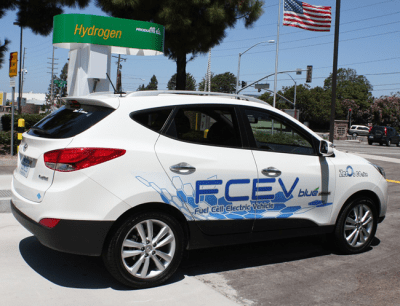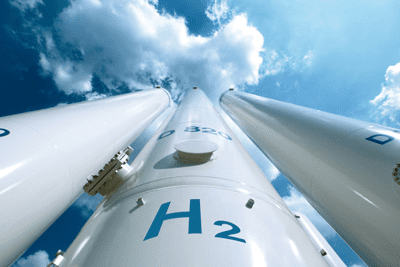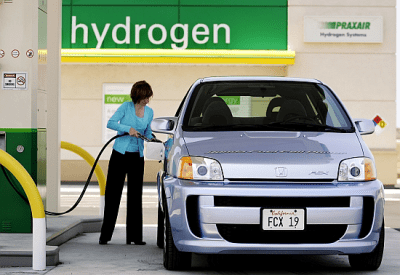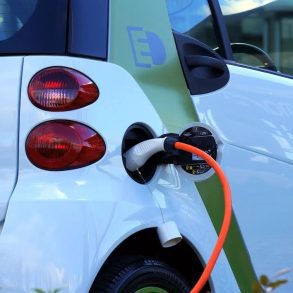In the past weeks, hydrogen fuel cell cars have been in the media again:
- Toyota revealed the FCV concept car and said costs of fuel cell vehicles have gone down from $1 million to $50.000-$100.000 in 10 years time.
- Hyundai stated that it will have a fuel cell vehicle on the market next year.
- and Tesla CEO Elon Musk, never afraid to speak his mind, called fuel cells Bullshit: “Hydrogen is quite a dangerous gas. You know, it’s suitable for the upper stage of rockets, but not for cars”.
Why are hydrogen fuel cell vehicles being developed?
 The idea for hydrogen fuel cell cars has been around for decades. Automobile manufacturers and universities all over the world have experimented with the technology, trying to figure out a way to make it work. But despite these years of research and the investment of billions of dollars, the simplest and most usable solution that is currently available for a reasonable price is the battery electric car.
The idea for hydrogen fuel cell cars has been around for decades. Automobile manufacturers and universities all over the world have experimented with the technology, trying to figure out a way to make it work. But despite these years of research and the investment of billions of dollars, the simplest and most usable solution that is currently available for a reasonable price is the battery electric car.
Advocates of hydrogen mobility keep shouting the two main benefits of hydrogen from the rooftops:
- Hey, it reduces our dependency on foreign oil, and it will never run out!
and
- Hey, you can drink from the tailpipe, because there’s zero exhaust emissions, just water!
 Of course, this will get populist and short-sighted politicians on the band wagon, using the promotion of hydrogen mobility and the promise of even more billions of subsidy into the further development of hydrogen cars. This should show how savvy and involved with the environment they are, but what they are eager to forget (conceal) is that hydrogen is a backwards and utterly superfluous technology for cars.
Of course, this will get populist and short-sighted politicians on the band wagon, using the promotion of hydrogen mobility and the promise of even more billions of subsidy into the further development of hydrogen cars. This should show how savvy and involved with the environment they are, but what they are eager to forget (conceal) is that hydrogen is a backwards and utterly superfluous technology for cars.
Why shouldn’t hydrogen fuel cell vehicles be developed?
Sure, hydrogen is the most abundant element in the universe, and it’s only used as an energy carrier, so it doesn’t get used up in a fuel cell. However, it doesn’t exactly grow on trees either, and there are no underground “hydrogen pockets” that we can simply pump it out from. It doesn’t exist on our planet in a pure state, so it has to be extracted from compounds from which it doesn’t really want to be separated, taking a lot of energy.
 You’d think hydrogen would simply be made by splitting water (H2O) into hydrogen (H2) and oxygen (O), but this proves too inefficient, so about 95 percent comes from fossil fuels, mostly natural gas, a process which creates carbon monoxide and carbon dioxide and makes the first argument pointless. Also, it costs more energy than it will generate when reversed in the fuel cell (six units of coal energy are needed to produce one unit of hydrogen energy). As a result, a hydrogen car will not be environmentally friendly until the energy is generated from solar power or wind power, just like a battery electric vehicle.
You’d think hydrogen would simply be made by splitting water (H2O) into hydrogen (H2) and oxygen (O), but this proves too inefficient, so about 95 percent comes from fossil fuels, mostly natural gas, a process which creates carbon monoxide and carbon dioxide and makes the first argument pointless. Also, it costs more energy than it will generate when reversed in the fuel cell (six units of coal energy are needed to produce one unit of hydrogen energy). As a result, a hydrogen car will not be environmentally friendly until the energy is generated from solar power or wind power, just like a battery electric vehicle.
The practical issues against hydrogen fuel cell cars
But the battery electric vehicle starts to take a clear advantage when storage and distribution is taken into account.
A large amount of hydrogen is required to generate just a small amount of energy. As a result, cars would need huge tanks with hydrogen or they’d have a very short range between fuel stops. That makes it a necessity to build an extensive network of hydrogen fuel stations.
 Also, hydrogen is an extremely explosive and dangerous gas (remember the Hindenburg?), which needs enormous and very strong tanks to be stored either as a gas or in liquid form. In order to find practical ways to store hydrogen, a lot of research still needs to be carried out, which will take at least another decade or two. And the same problems that create barriers for storage arise in distribution, as it’s extremely dangerous and inefficient to distribute hydrogen by trucks driving to fuel stations. Experts consider the best and safest way to transport hydrogen is through an underground pipeline system, which not exactly a simple and cheap infrastructure to build.
Also, hydrogen is an extremely explosive and dangerous gas (remember the Hindenburg?), which needs enormous and very strong tanks to be stored either as a gas or in liquid form. In order to find practical ways to store hydrogen, a lot of research still needs to be carried out, which will take at least another decade or two. And the same problems that create barriers for storage arise in distribution, as it’s extremely dangerous and inefficient to distribute hydrogen by trucks driving to fuel stations. Experts consider the best and safest way to transport hydrogen is through an underground pipeline system, which not exactly a simple and cheap infrastructure to build.
Why should we go through all these complicated and dangerous steps and invest billions of dollars in order to produce, store and distribute energy in the form of hydrogen and then use that hydrogen to produce electricity for a motor, when the technology of EVs is already in use and electricity can be taken from power outlets in every home and office around the world and be stored in simple car batteries?
Who’s pushing hydrogen fuel cell vehicles?
 It seems there’s still a long way to go before hydrogen fuel cell vehicles will replace the internal combustion engine, if ever. First we need to find a way to produce hydrogen in an efficient and environmentally friendly way. Then we need to find ways to store and distribute hydrogen safely and efficiently. Then we need to build an enormous and complicated infrastructure to distribute hydrogen to fuel stations that also still need to be built. And then the consumer needs to be convinced that they need to pay more for hydrogen than for gasoline (and that’s without taxes!).
It seems there’s still a long way to go before hydrogen fuel cell vehicles will replace the internal combustion engine, if ever. First we need to find a way to produce hydrogen in an efficient and environmentally friendly way. Then we need to find ways to store and distribute hydrogen safely and efficiently. Then we need to build an enormous and complicated infrastructure to distribute hydrogen to fuel stations that also still need to be built. And then the consumer needs to be convinced that they need to pay more for hydrogen than for gasoline (and that’s without taxes!).
I believe there a two forces pushing hydrogen fuel cell vehicles:
- Oil companies that are afraid that gas stations will become redundant once everybody can charge their long-range EVs at home or at the office. Of course, they have already researched hydrogen production and would like you to fill your hydrogen car up at one of their hydrogen fuel stations.
- Governments that on one hand want to prove they’re environmentally conscious and not afraid to support upcoming technology and on the other hand are afraid to lose one of their biggest cash cows: taxes and duties on gasoline and diesel, which can easily be levied on hydrogen when the technology is widely accepted, but not so easy on electricity from a home power outlet that is used to “fuel” an EV.
Automakers have already invested billions of dollars into the research for hydrogen fuel cell vehicles, which makes it a very difficult decision to admit they have run into a dead end. They’d rather continue making the public believe hydrogen mobility is only a decade away, as they already have been saying for over 15 years now, and making us believe their brand is a technology leader, than to admit they have poured billions into a bullshit technology that will stay the fuel of the future forever.
Sure, science has made things that seemed impossible possible many times before, but it will take another decade or two and another handful of billions in order for hydrogen mobility to become a reality, if ever. And besides that, it’s just stupendously difficult and may be utterly pointless, as the technology and the infrastructure for battery EVs is already in place. No wonder fuel cells are also named “fool cells”. The investments could better be aimed at improving batteries in order to increase range and shorten charging times. Because when that happens, hydrogen will go the way of the dodo. But even then, there’s still a battle to be fought against two extremely powerful forces. I guess the car manufacturers just don’t want to bet against Big Oil and Big Government.








